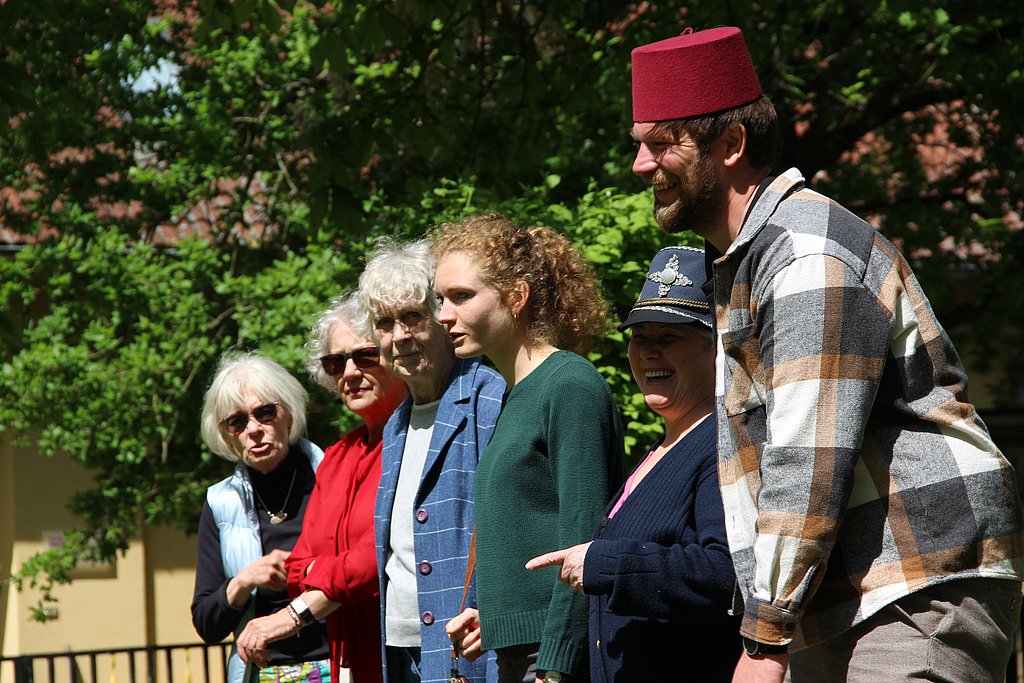*The article first appeared in issue 46 of the university magazine.
The final conference of the project will take place on 02.09.2024 - interested parties are cordially invited! → To the event
The idea
The Bühne frei project aims to use an interdisciplinary approach to combine urban and rural offerings and strengthen democratic forces. For example, it uses participatory artistic means to create spaces of opportunity in which residents from Berlin and Brandenburg can engage in an exchange that would otherwise probably never take place.
One massive problem is the rise in right-wing extremist potential in Brandenburg, which targets the center of society. Immigrants and racialized people have reason to worry about their safety and future. This needs to be counteracted with socio-cultural impulses.
The idea is to weaken anti-democratic tendencies by, for example, collaborating with partners to occupy public spaces in rural areas with artistic interventions and creating opportunities for communication in village life. This exchange also opens up new (experiential) spaces for urban residents. Accompanied by a broad-based study, this method is intended to have an exemplary effect and support the necessary development towards an open democratic civil society.
The basis
Two important projects laid the foundation for the "Bühne frei" project: "Dorf explorativ", funded by IFAF and led by Prof. Dr. Gesine Bär, and "Theater der Erfahrungen auf Landpartie", a three-year research project funded by the Ministry of Agriculture. These projects made it clear that stable meeting places and offers have a positive influence on social cohesion and can have a transformative effect on a community. In the comprehensive documentation of the latter project, "BÜHNE FREI in Brandenburg - Ein Altentheater auf Landpartie", it becomes clear which committed actors - the so-called "bridge builders" - could be called upon.
The Berlin-Brandenburg "crime scene"
The research field includes the municipalities of Gerswalde and Steinhöfel, areas in Brandenburg with similar problems. Refugee families and so-called "Neubrandenburgers" from Berlin and, temporarily, numerous Berliners have been living here in weekend homes since around 2015. In Berlin, the cooperating partners range from the church community in Gropiusstadt to Babel e. V. in Hellersdorf, from the Association for Socio-Cultural Work to the Berlin City Mission. The partners in the surrounding area are similarly diverse, including the Oder-Spree Cultural Office, the independent association MIKUB e. V. and Wasserburg Gerswalde. What they all have in common is the intention to strengthen tolerant communities.
What has happened so far
Through the use of artistic methods and museum education approaches, various activities have been initiated with actors from Berlin and Brandenburg and scientifically accompanied.
There has been ongoing cooperation with a group of district mothers from Neukölln, who had previously avoided the surrounding area due to concerns about possible xenophobic attacks. This group undertook trips to various cooperation partners in Gerswalde in Brandenburg, exchanged ideas with women from rural areas, jointly designed an exhibition in Berlin and returned to Brandenburg to discuss the stories of the region with residents and actors from a local history museum
In Heinersdorf, a German-Turkish theatre group for the elderly researched the topic of "heroines" with residents from the rural area and students from the Alice Salomon University of Applied Sciences Berlin. This artistic research led to a scenic performance in the public space on the village green of Steinhöfel and was framed by a festival. The actors erected living monuments to various actors from the community or unearthed a guest list from the cellars of a long-gone pub in order to stage stories.
A German-Turkish guest performance at the local elementary school enabled a further round of exchange. The interventions are currently being evaluated and accompanying film research is being carried out. The findings will be incorporated into new, participatory projects.
Interim results
The projects listed here illustrate how receptive the participants are to encounters. Whether it is an old village historian in Heinersdorf debating heroines with a visitor from Berlin or an interested resident in Gerswalde discussing the image of women with people from Lebanon, the opportunities and occasions for contact are seized. The people involved are often amazed at the rapidly developing closeness with those who are not so "different" after all. The accompanying film research provides a brief insight into our interim results. "Out of town - across the country" and "you have to take your time ...".
The team
The interdisciplinary project "Bühne frei" was launched in October 2022 and brings together a wide range of expertise: Prof. Dr. Oliver Rump (HTW Berlin) brings a museological approach, while Annegret Huth, research assistant and local actor, has initiated practical research in Heinersdorf. Prof. Johanna Kaiser (ASH Berlin) has a background in social cultural work with a focus on theater and conducts research primarily using filmic means. Sociologist Katja Zimmermann (ASH Berlin) works as a research assistant on the project and is involved in various artistic community projects in Gerswalde. The tutors Arianna Gusti (HTW Berlin) and Derya Ince (ASH Berlin) actively support the project. Dr. Nadin Tettschlag (WiMi, ASH Berlin) is involved in public relations.
Videos about the project are available online:
BÜHNE FREI in Brandenburg – A theater for the elderly on a country tour: https://vimeo.com/800471805
"Out of town – across the country": https: //www.youtube.com/watch?v=tdiftFLXR98
"You have to take your time...": https: //www.youtube.com/watch?v=gnWqRlOWU_0



